UNIT 8: Media and business
Key Unit Competence: To use language learnt in the context of media and
business.Introductory activity
Picture observation and interpretation

After interpreting these pictures, do the following activity:
1. What is the role of media in business advertisement?
2. Discuss the advantages of advertising your business on media.8.1 Describing words and expressions used in media and
business
8.1.1 Learning activities: Reading and text analysis.Activity 1
Read the passage below and answer the questions that follow
The Role of Social Media in Businesses
Social media has become an increasingly powerful tool over the last number
of years due to rapidly evolving technology. Social media is used daily among
consumers, clients, and businesses to communicate brand messages, share
stories, promote products, entertain, and more. There are a number ofpositive and negative effects of social media within businesses. Thus can
lead to various pros and cons as social media is such a powerful platform.
The role of social media has become extremely influential over recent years
as the average adult spends approximately two hours and forty minutes
on social media daily, which is increasing every year. Hence, it is crucial
for businesses to take full advantage of this power and use it to the best
of their ability for a positive outcome. From reading various journal articles
on the effects of social media in businesses it is evident that it has positive
and negative effects. Businesses and firms often face internal and external
pressures to adopt social media presence which can result in various
outcomes. Negative effects can be seen through the power of web, social
media backlashes, misuse of metrics, and when viral content goes wrong
which can cause risks for a business. On the other hand, positive effects
can be seen through the growth of company’s profits by enhancing customer
relationships. Also through the use of celebrities to influence consumers and
to essentially grow a larger consumer base. Businesses and companies
can also have a large impact on customers sharing their corporate social
responsibilities via social media.Social media has a large role to play within firms which can be critical to
the impact of their business. These roles include providing information to
consumers, connecting with stakeholders, heightening communication flow,
creating hype about products, growing a larger audience base, expanding
out beyond competitors, and thus generating sales. Through the rise of social
media, consumers have become increasingly dependent on one another to
value peer judgements and reviews on products more so than firm promotions
which is an indication of a shift in persuasive power. Social media has shifted
from one-way communication of direct marketing, e-mails, television, and
radio to a two-way model of communication where consumers can interact
and engage with businesses via social media. There are four main factors that
should be taken into consideration when deciding to integrate social media
into their business. These include determining what social media platform
would best work with their business, determining the potential benefits from
the use of social media, how the use of social media will differentiate them
from competitors, and determining the impact of their marketing efforts.On the other hand, negative effects of social media include conflicting
feedback or engagement from consumers, the pressure of constantly having
to keep updated and up to speed against competitors, and errors or distasteful
events within a company that can face backlash. The way in which consumers
interact and share information with one another has evolved rapidly in recent
years through the combined use of blogs, forums, social networking sites,
and podcasts.Social media has seen a dramatic shift in power away from the firm and
towards consumers and communities. When we think of social media content
that has gone viral often comical, entertaining, and interesting images come
to mind. However, this is not always the case and companies can often findthemselves in difficulty when a negative post, story, or video goes viral which
can impact their business.Marketers need to listen and learn, take the right tone and actions when
engaging with consumers. Consumers build up trust and bonds with products
and companies through loyalty and communities and feel betrayed when
businesses have faulty products, services, or cover-ups.
Adapted from: (Businesses, 2021)Comprehension questions
Answer the following questions.
1. Talk about the negative effects of social media on business
2. Explain the positive effects of social media in businesses
3. Discuss the role of social media within firms.
4. Discuss the four factors that should be taken into consideration when
deciding to integrate social media into the business.8.1.2 Application activities: Vocabulary and composition writing
A. Vocabulary
Activity 1
Give the meaning of the following words and expressions as used in the
above passage
1. pros and cons
2. platform
3. competitors
4. blogs
5. forums
6. firmsB. Sentence construction
Activity 2
Construct different sentences by using the words in number 1-6.
Activity 3
Write 250-300 words composition on the positive effects of social media in
businesses.8.2 Talking about advertisement in media
8.2.1 Learning activities: Reading and text analysisActivity 2
Reading comprehension
Read the following passage and answer the questions related to it.Social Media Advertising Tips to Master Your Small Business’s
StrategySocial media entices many small business owners with the dream of the next
big viral campaign. The reality of organic traffic on social media is tricky to
earn, and going viral is next to impossible to predict.These days, nearly every business is on social media, and it isn’t hard to
spot an ad on all social media platforms within a few seconds. Impressions
on advertisements have gone up 20% each year for several years in a row.
Despite this, the click-through rate of advertisements has decreased each
year since 2018.That data shows that the competition for attention on social media is fiercer
than ever. Advertising on social media offers several major benefits. It boosts
brand awareness, increases traffic, and offers insight into your current and
potential customers.Due to these benefits, social media advertising is cost-effective. You need
to understand what you want out of your social media strategy before it can
be effective. When you create an advertisement campaign on a social media
platform, you’ll often need to choose your advertising objective.Setting goals is an important aspect that determines a timeline for them.
That’s where a social media calendar comes in. Posting new content regularly
keeps your audience engaged and improves your organic reach. Determine
a posting schedule, and stick to it.A useful social media advertising tip is to use a social media automation tool
like Social Pilot to schedule your posts ahead of time. Today’s social media
trends rely on being relatable. To understand what your audience relates
to, you’ll need to gather data. Social media should feel authentic but have
concrete research.You can start with information from your website via Google Analytics. Take
notice of when your audience is most active, the posts they engage with, and
their demographics. Facebook, Twitter, and Instagram’s integrated tools can
also be a valuable source of data. You will need a business account to gain
access to raw information about your engagement.One social media advertising tip for gathering data is to use a social media
analytics tool like Hoot suite. These tools can simplify manage your social
media account by monitoring your brand’s engagement, clicks, and reach.
A quick social media advertising tip for your profile is to create a business
hashtag and include it in your bio so customers can find content relevant to
your brand.Finally, Social media advertising is an important digital marketing strategy
for every business, no matter the size or industry. With these social media
advertising tips, you can leverage your social presence.Adapted from: (Thomas, 2021)
A. Comprehension questions
Answer the following questions.
1. Discuss the reality of organic traffic on social media.
2. Advertising on social media offers several major benefits. Explain them
3. Posting new content regularly keeps your audience engaged and improves
your organic reach. Discuss this with reference to the text
4. What can a business hashtag help you?8.2.2 Application activities: Vocabulary and debate
A. Vocabulary


Activity 2
Debate on the following motion:
“Advertising on media have more harm than good”.8.3 Language structure
8.3.1 Reported speech
Reported speech is when we tell someone what another person said. To do this, we
can use direct speech or indirect speech.Look at these examples to see how we can tell someone what another person said.
Direct speech: ‘I love the Toy Story films,’ she said.
Indirect speech: She said she loved the Toy Story films.
Direct speech: ‘I worked as a waiter before becoming a chef,’ he said.
Indirect speech: He said he’d worked as a waiter before becoming a chef.
Direct speech: ‘I’ll phone you tomorrow,’ he said.
Indirect speech: He said he’d phone me the next day.
Direct speech: ‘I work in a bank,’ said Daniel.
Indirect speech: Daniel said that he worked in a bank.In indirect speech, we often use a tense which is ‘further back’ in the past (e.g.
worked) than the tense originally used (e.g. work). This is called ‘backshift’. We
may also need to change other words that were used, for example pronouns.Present simple, present continuous and present perfect
When we backshift, present simple changes to past simple, present continuous
changes to past continuous and present perfect changes to past perfect.Example:
Direct speech: ‘I travel a lot in my job.’
Indirect speech: Jamila said that she travelled a lot in her job.
Direct speech: ´The baby’s sleeping!’
Indirect speech: He told me the baby was sleeping.
Direct speech: ‘I’ve hurt my leg.’
Indirect speech: She said she’d hurt her leg.Past simple and past continuous
When we backshift, past simple usually changes to past perfect simple, and past
continuous usually changes to past perfect continuous.Examples:
Direct speech: ‘We lived in China for five years.’
Indirect speech: She told me they’d lived in China for five years.
Direct speech: ‘It was raining all day.’
Indirect speech: He told me it had been raining all day.Past perfect
The past perfect doesn’t change.Direct speech: ‘I’d tried everything without success, but this new medicine is great.’
Indirect speech: He said he’d tried everything without success, but the new medicine
was great.Pronouns, demonstratives and adverbs of time and place
Pronouns also usually change in indirect speech.
Direct speech: ‘I enjoy working in my garden,’ said Bob.
Indirect speech: Bob said that he enjoyed working in his garden.
Direct speech: ‘We played tennis for our school,’ said Elina.
Indirect speech: Elina told me they’d played tennis for their school.However, if you are the person or one of the people who spoke, then the pronouns
don’t change.Direct speech: ‘I’m working on my thesis,’ I said.
Indirect speech: I told her that I was working on my thesis.
Direct speech: ‘We want our jobs back!’ we said.
Indirect speech: We said that we wanted our jobs back.We also change demonstratives and adverbs of time and place if they are no longer
accurate.Direct speech: ‘This is my house.’
Indirect speech: He said this was his house. [You are currently in front of
the house.]Indirect speech: He said that was his house. [You are not currently in front
of the house.]Direct speech: ‘We like it here.’
Indirect speech: She told me they like it here. [You are currently in the place
they like.]Indirect speech: She told me they like it there. [You are not in the place they
like.]Direct speech: ‘I’m planning to do it today.’
Indirect speech: She told me she’s planning to do it today. [It is currently still
the same day.]Indirect speech: She told me she was planning to do it that day. [It is not the
same day anymore.]In the same way, these changes to those, now changes to then, yesterday changes
to the day before, tomorrow changes to the next/following day and ago changes to
before.
Below, we are sharing the rules to make changes from Direct to Indirect speech.
The changes of Direct and Indirect speech depend on some factors like modals,
reporting verb, place, time, tense, pronoun etc. You can check the complete
information of changes in Direct and Indirect speech.

Words are changed in an Indirect Speech to replace nearness from distance.
Changes as per Reporting Verb
According to the reporting verb, changes are made in the direct sentence or the
sentence in inverted commas.
• If the reporting verb is in the past tense, then the direct sentence is changed
in its past tense.
• The tense of direct speech remains unchanged when the reporting verb is
in the present or future tense.
• If the direct sentence contains the universal truth, then it remains unchanged
in the Indirect Speech.Activity 1
Change the following direct speeches into indirect speeches.
1. Gavin said, “He is young.”
2. Akeza says, “I am pretty.”
3. Richard will say, “I am tall.”
4. They said, “The sun rises in the east.”Activity 2
1. Lydia said, “What is Herena doing?”
2. Eddie said, “Will she come for lunch?”
3. The boy asked, “Where do you stay?”
4. Elizabeth said, “I am a good girl.”
5. I told them, “You have finished your work.”
6. He said, “She is in Kigali.”8.3.2 Passive voice
A passive voice construction is a grammatical voice construction that is found in
many languages. In a clause with passive voice, the grammatical subject expresses
the theme or patient of the main verb – that is, the person or thing that undergoes
the action or has its state changed.What is active voice, what is passive voice, and what are their
different functions?In the active voice, the subject is performing an action:
Example: The dog chases the ball.Notice how the subject, dog, is performing the action, chase, on the target of the
action, ball. This is a simple, direct example of the active voice.In the passive voice, the action’s target, ball, is positioned first as the focus of the
sentence. The sentence gets flipped, and the subject is now being acted upon by
the verb. In other words, the subject is passive:
Example: The ball is being chased by the dog.Active and passive are the two grammatical voices in English. Neither is inherently
better than the other, but each is suited to certain types of writing. There’s a reason
why news anchors sound detached from the stories they’re reportingActive voice
In the active voice, the sentence’s subject performs the action. Here are two
examples of sentences in the active voice:
1. Joy likes swimming.
2. She loves reading novels.No matter what verb you use, structuring your sentence so the subject performs the
verb is writing in the active voice.The active voice has a direct, clear tone. Use it when you want the reader to focus
on the subject of your sentence and the action it is doing rather than on the action’s
target.In the active voice, the sentence’s subject performs the action on the action’s target.
In the passive voice, the target of the action is the main focus, and the verb acts
upon the subject.Passive voice
In the passive voice, the action’s target is the focus, and the verb acts upon the
subject. Or, to put it in the passive voice, the subject is acted upon by the verb.
Every sentence in the passive voice contains two verbs:
• A conjugated form of “to be”
• The main verb’s past participleTo change a sentence from active to passive voice, do the following:
• Move the active sentence’s direct object into the sentence’s subject slot.
• Place the active sentence’s subject into a phrase beginning with the
preposition by.
• Add a form of the auxiliary verb be to the main verb and change the main
verb’s form.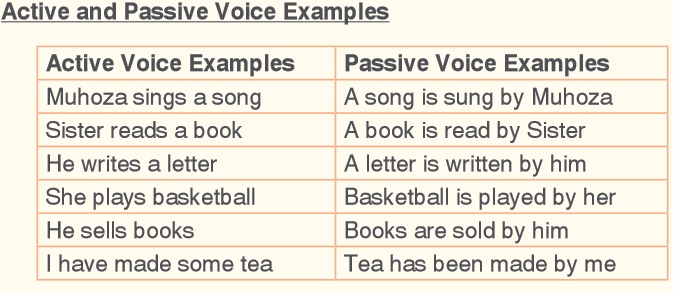
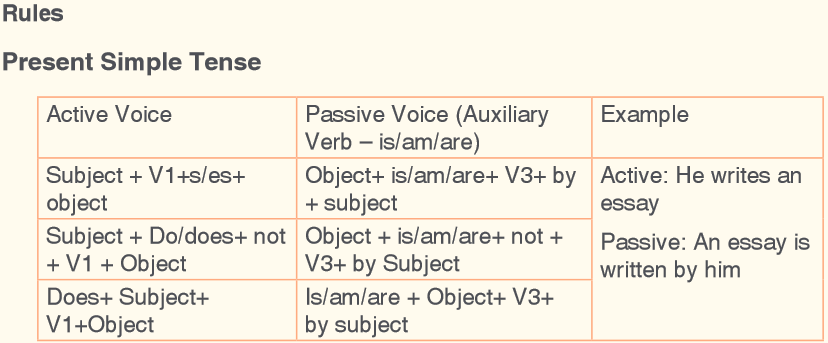
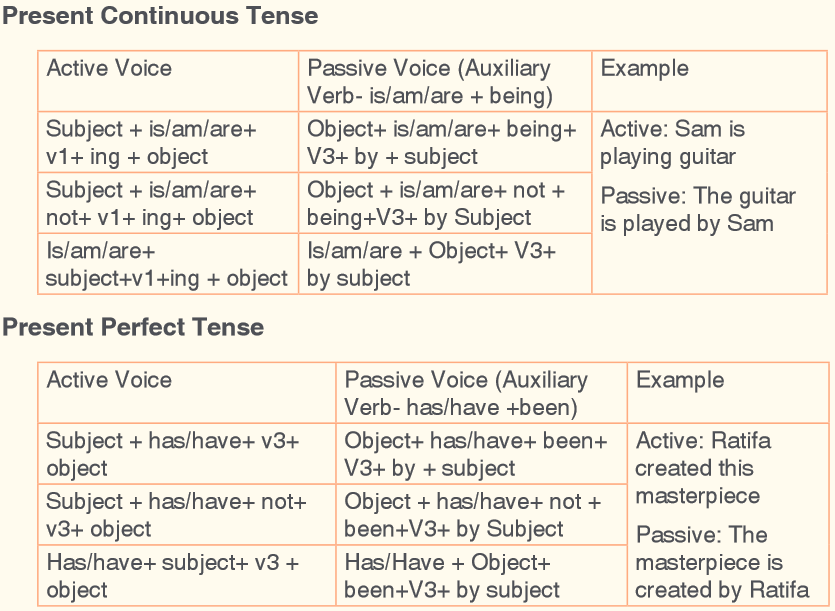
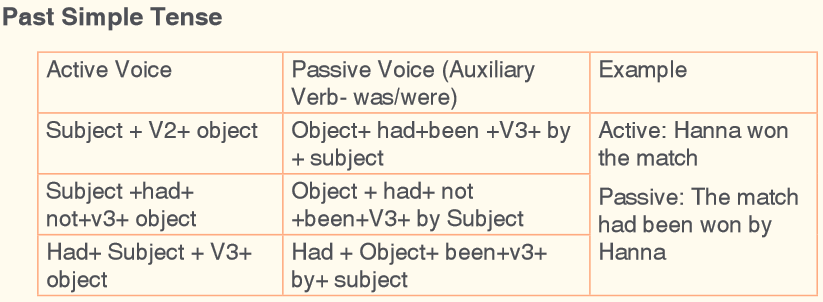

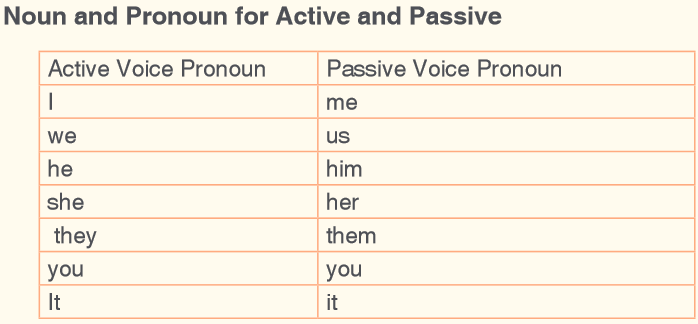
Activity 1: Convert these passive voice sentences into the active
voice:
1. Alana’s toes were crushed by the garage door.
2. The passive voice has likely been heard of by you.
3. Rebeca’s favorite spot in the lecture hall had been taken by the time she
got to class.
4. When the passive voice is overused, you often end up with flat writing.Activity 2: Complete the following sentences using appropriate active
or passive verbs forms from the given options.
1. The problem ___________ to the children (explained/was explained)
2. Those pyramids ___________ Around 400 A.D. (built/were built)
3. All the trouble ___________ By your mother. (has caused/was caused)
4. The visitors ___________ (were shown/ have shown) a collection of old
manuscripts.
5. I ___________ him ten thousand franks last year (lend/lent/was lent)
6. She ___________ of spiders. (frightened/is frightened)
7. That picture ___________ by my grandmother (painted/was painted)
8. I ___________ by his attitude (shocked/have shocked/was shocked)
9. Excuse me. The house ___________ (is painting/is being painted/has
painted)
10. I knew why I ___________ (had chosen/had been chosen)Activity 3: Change the following sentences into the passive voice.
1. They elected him chairman.
2. The children laughed at the beggar.
3. The guard caught the thief.
4. The soldiers attacked the enemy barracks.
5. The cat drank all the milk.
6. The old man takes snuff.
7. Somebody hit the dog with a kick.
8. I will order the carriage.
9. One may accomplish anything with a little effort.
10. A thunderstorm often turns milk sour.8.4 End unit assessment
Activity 1
Go through the sentences given below and identify the voice used.
1. Shreya Ghoshal sings beautiful songs.
2. The Sun sets in the West.
3. The boy was being beaten by his teacher.
4. Bucky is helped by Steve.
5. The carpenter is building the desk.
6. The woodcutter cut down the tree.
7. The man dropped his axe into the river.
8. The bird was shot by the naughty boy.
9. The bag was found by me.10. Natasha lost the money.
11. The farmer will plough the field.
12. The work will be finished by the workers in a day.
13. The enemy has entered the war zone.
14. Who sang the song?
15. The children teased the animals.Activity 2
Fill in the gaps with the correct form of passive voice
It was said that a certain man was very good in the whole village. Many good
things _____1_____ (say) about him, but the most interesting is that when he
died, he _____2_____ (mourn) by all creatures including animals. His body
_____3_____ (carry) by Gorillas, the wreaths _____4_____ (fly) by birds and
flowers _____5_____ (offer) to perfume the atmosphere. After burying him,
his spirit _____6_____ (see) playing with babies. Elders _____7_____ (scare)
by this beautiful yet terrifying image. Food _____8_____ (leave) by women
cooking, doors _____9_____ (tight/close) and windows _____10_____ (hear)
banging. A soft voice _____11_____ (hear) coming from the spirit saying. I
_____12_____ (treat) well by all of you, no one _____13_____ (harm) by this
peaceful spirit. On hearing this,
every one _____14_____ (excite) and wanted to see for themselves but the
spirit _____15_____ (take) by the soft
wind. Their eyes _____15_____ (fill) with tears of both joy and sadness. This
is the last time he _____16_____ (see) in the neighbourhood.Activity 3
Writing skills
In not more than 300 words, discuss the advantages and disadvantages of
using media in business.References
Books
1. Musinguzi M. et Al. (2016). General studies and communication skills,
Longhorn Publishers
2. Robert Ramsey. (1987). The Languages of China. Princeton: University
Press
3. Ashley Crossman. (2018). Customs: Their Importance in Society.
4. Rwanda Education Board. (2019). English language book for secondary
schools. Senior 6. Kigali: REB
5. Rwanda Education Board. (2019). Economics for Rwanda secondary
Schools, book five. Kigali: REB
6. Raymond Murphy. (2019). English Grammar In Use. Cambridge University
Press
Electronic sources
1. Albert Einstein, A. L.-Z. (2019). Ethical Behavior Quotes. Retrieved
January 22, 2023, from Ethical Behavior Quotes: https://www.azquotes.
com/quotes/topics/ethical-behavior.html
2. Austen, H. (2018). EF Education First Group. Retrieved JAnuary 20, 2023,
from Describe your daily routine: https://englishlive.ef.com/blog/english-in-
the-real-world/useful-english-phrases-describe-daily-routine/
3. Businesses, T. R. (2021, October 03). Edubirdie. Retrieved February 01,
2023, from https://edubirdie.com/examples/the-role-of-social-media-in-
businesses/.
4. Cram. (2023). The Importance Of Happiness In Beloved Communities.
Retrieved January 20, 2023, from Cram: https://www.cram.com/
essay/The-Importance-Of-Happiness-In-Beloved-Communities/
FC6UVAYXT#:~:text=When%20in%20a%20good%20mood,what%20
everyone%20should%20strive%20for.
5. EnglishClub. (1997). EnglishClub. Retrieved January 25, 2023, from What
are Phrasal Verbs: https://www.englishclub.com/grammar/phrasal-verbs.
htm
6. Jha, M. (2015). EDUCBA. Retrieved January 27, 2023, from Accounting
Ethics: https://www.educba.com/accounting-ethics/
7. Job Hunting. (2021, August 10). Job Hunting. Retrieved January 22,
2023, from Job Hunting: https://www.studymode.com/essays/Job-
Hunting-65050531.html
8. Kishen. (2021, April 3). NCERT Books. Retrieved January 24, 2023, from
Conversation Between Shopkeeper/ Salesman and Customer: https://
www.ncertbooks.guru/conversation-between-shopkeeper-salesman-and-
customer/9. Mandal, M. (2022, July 27). IELTS Exam. Retrieved January 25,
2022, from Business and Money IELTS Essay Samples: https://www.
upgradabroad.com/exam/ielts/business-and-money-ielts-essay
10. Miller, K. (2019, November 27). Northeastern University. Retrieved January
27, 2023, from What Does an Accountant Do: https://www.northeastern.
edu/bachelors-completion/news/what-does-an-accountant-do/
11. Mondal, P. (2012, 12). Essay on Community. Retrieved January
20, 2023, from Essay on Community: https://www.yourarticlelibrary.
com/essay/community-essay-on-community-737-words-
sociology/6236#:~:text=Community%20is%20another%20fundamental%20
concept,his%20fellows%20in%20a%20group.
12. Thomas, M. (2021, October 01). Social Media Advertising Tips To Master
Your Small Business’s Strategy. Retrieved February 02, 2023, from https://
www.bluehost.com/blog/social-media-advertising-tips/.
13. Writers, E. (2023). EssaysWriters.com. Retrieved January 29, 2023, from
https://essayswriters.com/essays/Exploratory/cross-cultural-exchange.
html.
